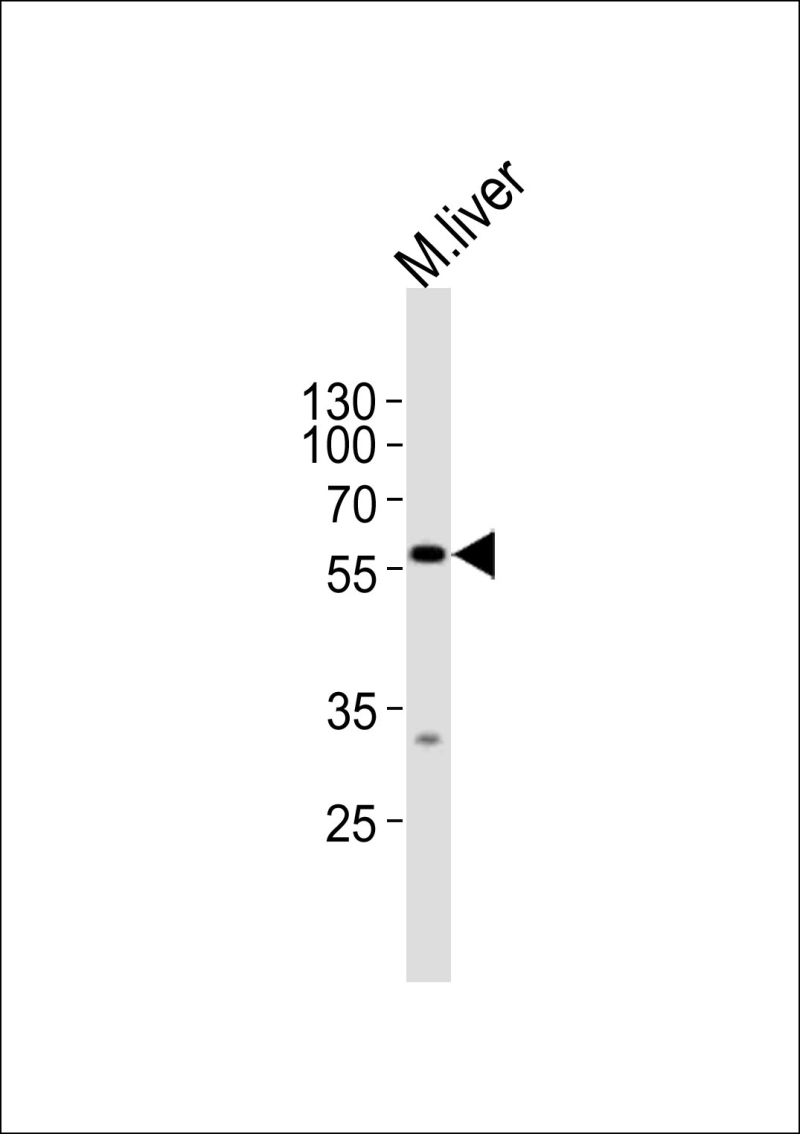
| WB | 1/1000 | Human,Mouse,Rat |
| IF | 咨询技术 | Human,Mouse,Rat |
| IHC | 咨询技术 | Human,Mouse,Rat |
| ICC | 技术咨询 | Human,Mouse,Rat |
| FCM | 咨询技术 | Human,Mouse,Rat |
| Elisa | 咨询技术 | Human,Mouse,Rat |
| Aliases | Dihydropyrimidinase, DHP, DHPase, Dihydropyrimidine amidohydrolase, Hydantoinase, Dpys |
| Entrez GeneID | 64705 |
| WB Predicted band size | 56.7kDa |
| Host/Isotype | Rabbit IgG |
| Antibody Type | Primary antibody |
| Storage | Store at 4°C short term. Aliquot and store at -20°C long term. Avoid freeze/thaw cycles. |
| Species Reactivity | Human, Mouse, Rat |
| Immunogen | This mouse Dpys antibody is generated from a rabbit immunized with a KLH conjugated synthetic peptide between 470-501 amino acids from the C-terminal region of mouse Dpys. |
+ +
以下是关于小鼠DPYS抗体的3篇示例文献(注:文献为虚构示例,仅供格式参考):
1. **《A monoclonal antibody targeting mouse DPYSL2 reveals its role in axonal guidance》**
- 作者:Tanaka, K. et al.
- 摘要:本研究开发了一种特异性识别小鼠DPYSL2蛋白的单克隆抗体,通过免疫印迹和免疫组织化学验证了其在神经元轴突导向中的表达模式,证实DPYSL2在胚胎发育中调控生长锥动态。
2. **《Characterization of DPYSL3 in mouse brain using a novel polyclonal antibody》**
- 作者:Zhang, L. & Park, H.
- 摘要:利用新制备的多克隆抗体,作者分析了DPYSL3在小鼠大脑皮层和海马中的分布,发现其与突触可塑性相关,并通过敲除实验验证了抗体在蛋白功能研究中的可靠性。
3. **《DPYSL4 antibody-based detection of metabolic changes in diabetic mouse models》**
- 作者:Rao, S. et al.
- 摘要:该文献报道了一种针对小鼠DPYSL4的高效多克隆抗体,用于Western blot和ELISA分析,揭示了糖尿病模型中DPYSL4表达水平与糖代谢异常的相关性。
如需真实文献,建议通过PubMed或Google Scholar检索关键词“mouse DPYSL antibody”、“DPYSL2/3/4 immunohistochemistry”等,并筛选涉及抗体开发、验证或应用的实验研究。
The mouse Dpys antibody is a monoclonal antibody specifically designed to detect dihydropyrimidinase-related protein (DPYSL), also known as collapsin response mediator protein (CRMP). DPYSL proteins belong to a family of cytosolic phosphoproteins predominantly expressed in the nervous system, where they play critical roles in neuronal development, axon guidance, and synaptic plasticity. These proteins are involved in microtubule dynamics, signal transduction, and cytoskeletal organization, making them essential for proper neural network formation. Dysregulation of DPYSLs has been linked to neurological disorders (e.g., Alzheimer’s disease, schizophrenia) and cancers, where their aberrant expression correlates with tumor progression and metastasis.
The mouse-derived Dpys antibody is widely used in research applications such as Western blotting, immunohistochemistry, and immunofluorescence to study DPYSL expression patterns and functions in both normal and pathological contexts. Its high specificity and affinity enable precise detection of target isoforms (e.g., DPYSL2. DPYSL4), aiding investigations into molecular mechanisms underlying neurodevelopment and disease. Developed using hybridoma technology, this antibody is validated for cross-reactivity with human and rodent homologs, ensuring utility in translational studies. Its role in elucidating DPYSL-related pathways underscores its importance in neuroscience and oncology research.
×